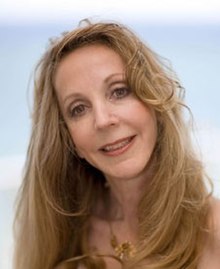
Back ريبيكا غولدشتاين Arabic ريبيكا جولدشتاين ARZ Rebecca Goldstein German Rebecca Goldstein Spanish ربکا گلدشتاین FA Rebecca Goldstein Finnish Rebecca Goldstein French רבקה גולדסטיין HE Rebecca Goldstein ID Rebecca Goldstein IG
Rebecca Goldstein | |
|---|---|
 | |
| Born | Rebecca Newberger February 23, 1950 White Plains, New York, U.S. |
| Alma mater | Barnard College (BA) Princeton University (PhD) |
| Spouses | |
| Children |
|
| Institutions | Columbia University Rutgers University Trinity College Harvard University New York University[1] |
Rebecca Newberger Goldstein (born February 23, 1950) is an American philosopher, novelist, and public intellectual. She has written ten books, both fiction and non-fiction. She holds a Ph.D. in philosophy of science from Princeton University, and is sometimes grouped with novelists such as Richard Powers and Alan Lightman, who create fiction that is knowledgeable of, and sympathetic toward, science.[5][6]
In her three non-fiction works, she has shown an affinity for philosophical rationalism, as well as a conviction that philosophy, like science, makes progress,[7] and that scientific progress is itself supported by philosophical arguments.[8]
Increasingly, in her talks and interviews, she has been exploring what she has called "mattering theory" as an alternative to traditional utilitarianism.[9][10] This theory is a continuation of her idea of "the mattering map", first suggested in her novel The Mind–Body Problem. The concept of the mattering map has been widely adopted in contexts as diverse as cultural criticism,[11][12] psychology,[13] and behavioral economics.[14]
Goldstein is a MacArthur Fellow, and has received the National Humanities Medal[15] and the National Jewish Book Award.
- ^ Communications, NYU Web. "Rebecca Newberger Goldstein Named 2014 National Humanities Medal Recipient". nyu.edu.
- ^ "Sheldon Goldstein" (PDF). Rutgers University, Department of Mathematics.
- ^ Kadish, Rachel (2012). "The Physics of Fiction, the Music of Philosophy: an Interview with Rebecca Newberger Goldstein". Ploughshares. Emerson College.
- ^ Interview with Rebecca Goldstein (2006). "Novelist Rebecca Goldstein - The Mind-Body Problem". www.lukeford.net.
- ^ Lightman, Alan (15 March 2003). "Art That Transfigures Science". The New York Times.
- ^ Schillinger, Liesl. "Prove It". The New York Times. Retrieved 29 January 2010.
- ^ Goldstein, Rebecca Newberger (14 April 2014). "How Philosophy Makes Progress" – via The Chronicle of Higher Education.
- ^ Anthony, Andrew (19 October 2014). "Rebecca Newberger Goldstein: "Science is our best answer, but it takes a philosophical argument to prove that"". The Observer – via The Guardian.
- ^ "Feminism, Religion, and 'Mattering'". www.secularhumanism.org. 26 July 2019.
- ^ "The Machinery of Moral Progress: An Interview with Rebecca Newberger Goldstein – TheHumanist.com". 27 August 2014.
- ^ Grossberg, Lawrence (1992). We Gotta Get Out of This Place: Popular Conservatism and Postmodern Culture. Routledge.
- ^ Grossberg, Lawrence (2010). Cultural Studies in the Future Tense. Duke University Press.
- ^ Kashak, Ellyn (2013). "The Mattering Map: Integrating The Complexities of Knowledge, Experience and Meaning". Psychology of Women Quarterly. 37 (4): 436–443. doi:10.1177/0361684313480839. S2CID 144899088.
- ^ Loewenstein, Meine, G., K. "On Mattering Maps" in Understanding Choice, Explaining Behavior: Essays in Honour of Ole-Jørgen Skog, Jon Elster, Olav Gjelsvik, Aanund Hyland, and Karl Moene (Eds.). Oslo, Norway: Oslo Academic Press. pp. 153–175.
{{cite book}}: CS1 maint: multiple names: authors list (link) - ^ "Rebecca Newberger Goldstein". National Endowment for the Humanities. 2 September 2015.